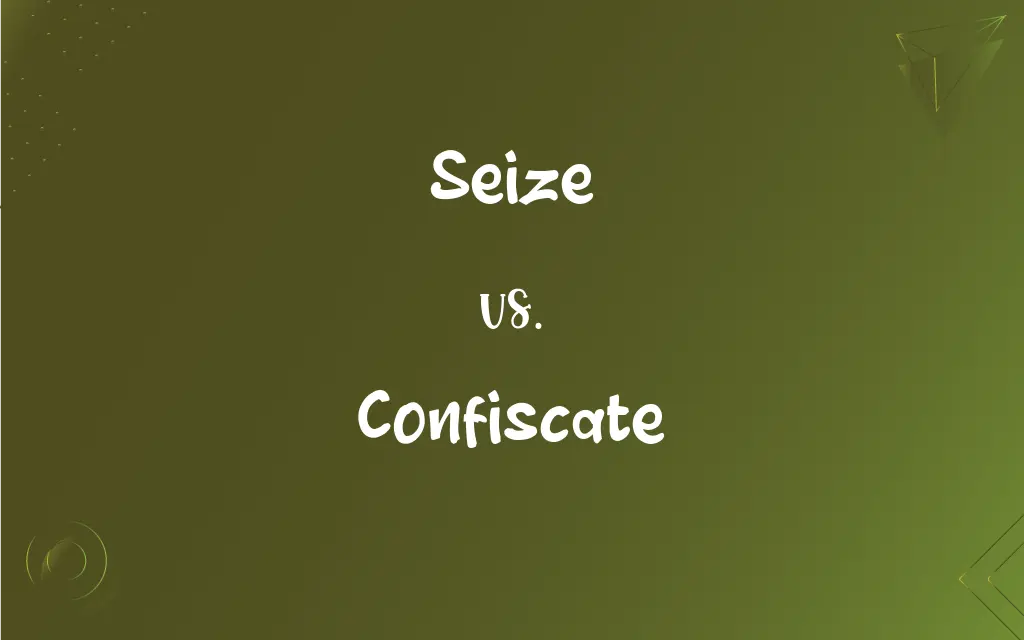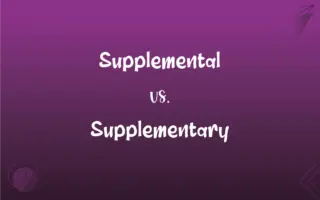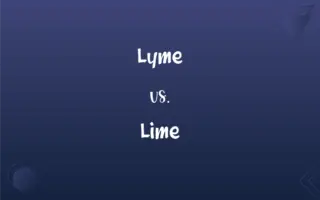Seize vs. Confiscate: What's the Difference?
Edited by Harlon Moss || By Janet White || Updated on November 30, 2023
Seizing is the act of taking hold of something suddenly and forcibly, while confiscating is the act of taking away something, especially as a penalty or for legal reasons.

Key Differences
Seize implies taking control or possession of something quickly and forcefully, often without warning. Confiscate, however, suggests a formal or legal process of taking possession, usually due to violation of a law or regulation.
Seizure can be temporary and doesn't always imply legal authority, whereas confiscation is typically permanent and backed by legal justification. Both actions involve taking control, but the context and permanence differ.
In everyday language, to seize can also mean to grasp an opportunity swiftly, not just physical items. Confiscate is more specific and always involves taking possession of property, typically by an authority figure.
Seizing can happen in various contexts, from physical action to metaphorical opportunities. Confiscating is more narrowly defined, almost exclusively used in legal or disciplinary contexts.
The intent behind seizing can vary widely, from opportunistic to protective actions. In contrast, confiscating almost always carries the connotation of penalty or enforcement of rules.
ADVERTISEMENT
Comparison Chart
Context
Can be physical or metaphorical
Primarily legal or authoritative
Nature of Action
Sudden and forceful
Formal and backed by law or rules
Permanence
Can be temporary or permanent
Usually permanent
Legal Authority Required
Not necessarily
Yes
Connotation
Opportunistic, protective, or aggressive
Penal, authoritative, enforcing rules or regulations
ADVERTISEMENT
Seize and Confiscate Definitions
Seize
To take hold of suddenly and forcibly.
The officer seized the weapon from the suspect.
Confiscate
To take or seize someone's property with authority.
The school principal confiscated the student's phone.
Seize
To capture or take something by force.
The rebels seized control of the capital.
Confiscate
To seize property for legal or official reasons.
The government confiscated land for the new highway.
Seize
To take possession of something, often by legal authority.
The customs agents seized illegal goods at the border.
Confiscate
To take away something as a penalty.
The teacher confiscated all cheat sheets during the exam.
Seize
To grasp something quickly and eagerly.
She seized the opportunity to travel abroad.
Confiscate
To seize goods or property as a legal penalty.
Customs officials confiscated counterfeit merchandise.
Seize
To understand or grasp something mentally.
He seized the main idea of the lecture immediately.
Confiscate
To appropriate private property for state or public use.
The military confiscated houses to quarter troops.
Seize
To grasp suddenly and forcibly; take or grab
Seize a sword.
Confiscate
To seize (private property) for the public treasury, especially as a penalty for wrongdoing.
Seize
To take by force; capture or conquer
The kidnappers seized the prince. The invaders seized the city.
Confiscate
To seize by authority
The teacher confiscated all the comic books we had in class.
FAQs
Can an individual legally seize property?
Individuals usually cannot legally seize property unless they have specific authority or justification.
What does confiscate mean?
To confiscate means to formally take away someone's property, typically for legal reasons.
What does it mean to seize something?
To seize means to take hold of suddenly and forcefully.
Who can confiscate property?
Property is usually confiscated by authorities, like law enforcement or school officials, under legal or policy-based circumstances.
What's an example of non-physical seizing?
Non-physical seizing includes grasping a concept quickly or taking advantage of an opportunity.
Is seizing always a physical action?
No, seizing can also refer to taking opportunities or understanding concepts.
Does confiscation require legal backing?
Yes, confiscation typically requires legal backing or follows specific rules or policies.
Can seized items be returned?
Seized items can sometimes be returned, depending on the context and legal circumstances.
Is confiscation a form of punishment?
Confiscation can be a form of punishment, particularly in disciplinary contexts like schools or as a legal penalty.
What happens to confiscated items?
Confiscated items may be held, destroyed, or used by the confiscating authority, depending on the situation and legal framework.
Can personal property be seized?
Personal property can be seized, particularly if it's involved in illegal activities or poses a danger.
Are there legal protections against wrongful seizure?
Yes, legal systems often provide protections against wrongful seizure, including recourse through courts.
Are there limits to what can be confiscated?
Legal and policy limits exist on what can be confiscated, varying by jurisdiction and context.
What's a common example of seizing in everyday life?
A common example is someone seizing a chance to speak in a meeting.
Do police have the right to seize private property?
Police can seize private property if they have legal grounds, such as evidence in a crime.
Can schools confiscate students' belongings?
Schools can confiscate students' belongings, usually if they violate school rules or disrupt the educational process.
Does seizing imply immediacy?
Seizing often implies a sudden or immediate action.
Under what circumstances can items be confiscated?
Items can be confiscated if they're illegal, prohibited by policy, or used inappropriately.
Can confiscated items be contested in court?
Yes, the legality of confiscation can be contested in court.
Is confiscation always related to misconduct?
Confiscation often relates to misconduct but can also occur for regulatory or safety reasons.
About Author
Written by
Janet WhiteJanet White has been an esteemed writer and blogger for Difference Wiki. Holding a Master's degree in Science and Medical Journalism from the prestigious Boston University, she has consistently demonstrated her expertise and passion for her field. When she's not immersed in her work, Janet relishes her time exercising, delving into a good book, and cherishing moments with friends and family.
Edited by
Harlon MossHarlon is a seasoned quality moderator and accomplished content writer for Difference Wiki. An alumnus of the prestigious University of California, he earned his degree in Computer Science. Leveraging his academic background, Harlon brings a meticulous and informed perspective to his work, ensuring content accuracy and excellence.
































































